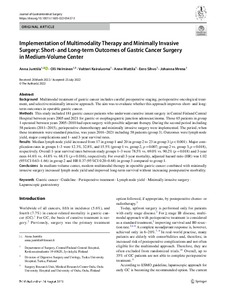Implementation of Multimodality Therapy and Minimally Invasive Surgery: Short- and Long-term Outcomes of Gastric Cancer Surgery in Medium-Volume Center
Junttila Anna; Helminen Olli; Kairaluoma Valtteri; Mattila Anne; Sihvo Eero; Mrena Johanna
https://urn.fi/URN:NBN:fi-fe2022102463046
Tiivistelmä
Background Multimodal treatment of gastric cancer includes careful preoperative staging, perioperative oncological treatment, and selective minimally invasive approach. The aim was to evaluate whether this approach improves short- and long-term outcomes in operable gastric cancer.
Methods This study included 181 gastric cancer patients who underwent curative intent surgery in Central Finland Central Hospital between years 2005 and 2021 for gastric or esophagogastric junction adenocarcinoma. Those 65 patients in group 1 operated between years 2005-2010 had open surgery with possible adjuvant therapy. During the second period including 58 patients (2011-2015), perioperative chemotherapy and minimally invasive surgery were implemented. The period, when these treatments were standard practise, was years 2016-2021 including 58 patients (group 3). Outcomes were lymph node yield, major complications and 1- and 3-year survival rates.
Results Median lymph node yield increased from 17 in group 1 and 20 in group 2 to 23 in group 3 (p < 0.001). Major complication rates in groups 1-3 were 12.3%, 32.8%, and 15.5% (group 1 vs. group 2, p = 0.007; group 2 vs. group 3, p = 0.018), respectively. Overall 1-year survival rates between study groups 1-3 were 78.5% vs. 69.0% vs. 90.2% (p = 0.018) and 3-year rates 44.6% vs. 44.8% vs. 68.1% (p = 0.016), respectively. For overall 3-year mortality, adjusted hazard ratio (HR) was 1.02 (95%CI 0.63-1.66) in group 2 and HR 0.37 (95%CI 0.20-0.68) in group 3 compared to group 1.
Conclusions In medium-volume center, modern multimodal therapy in operable gastric cancer combined with minimally invasive surgery increased lymph node yield and improved long-term survival without increasing postoperative morbidity.
Kokoelmat
- Rinnakkaistallenteet [29335]
